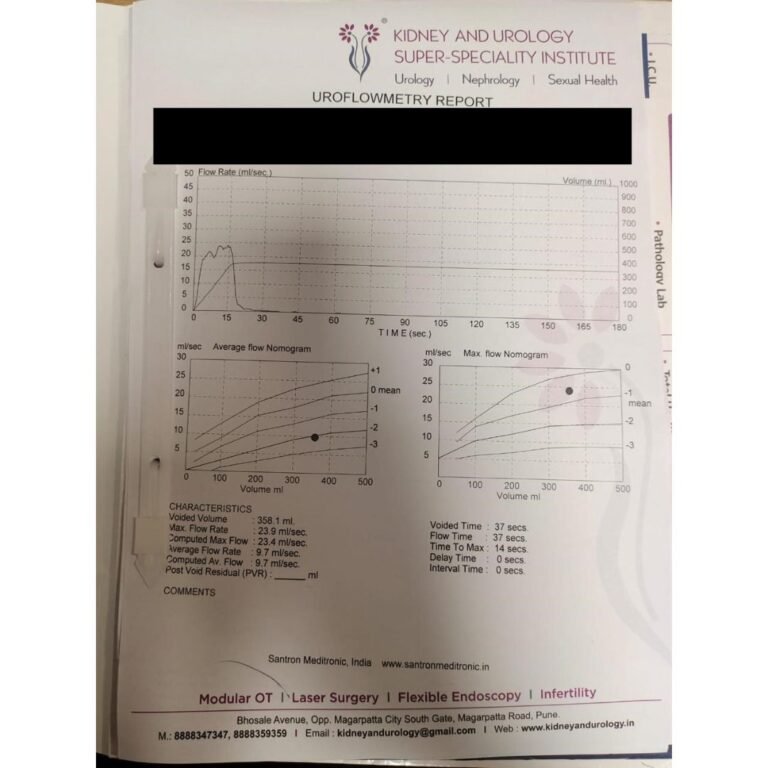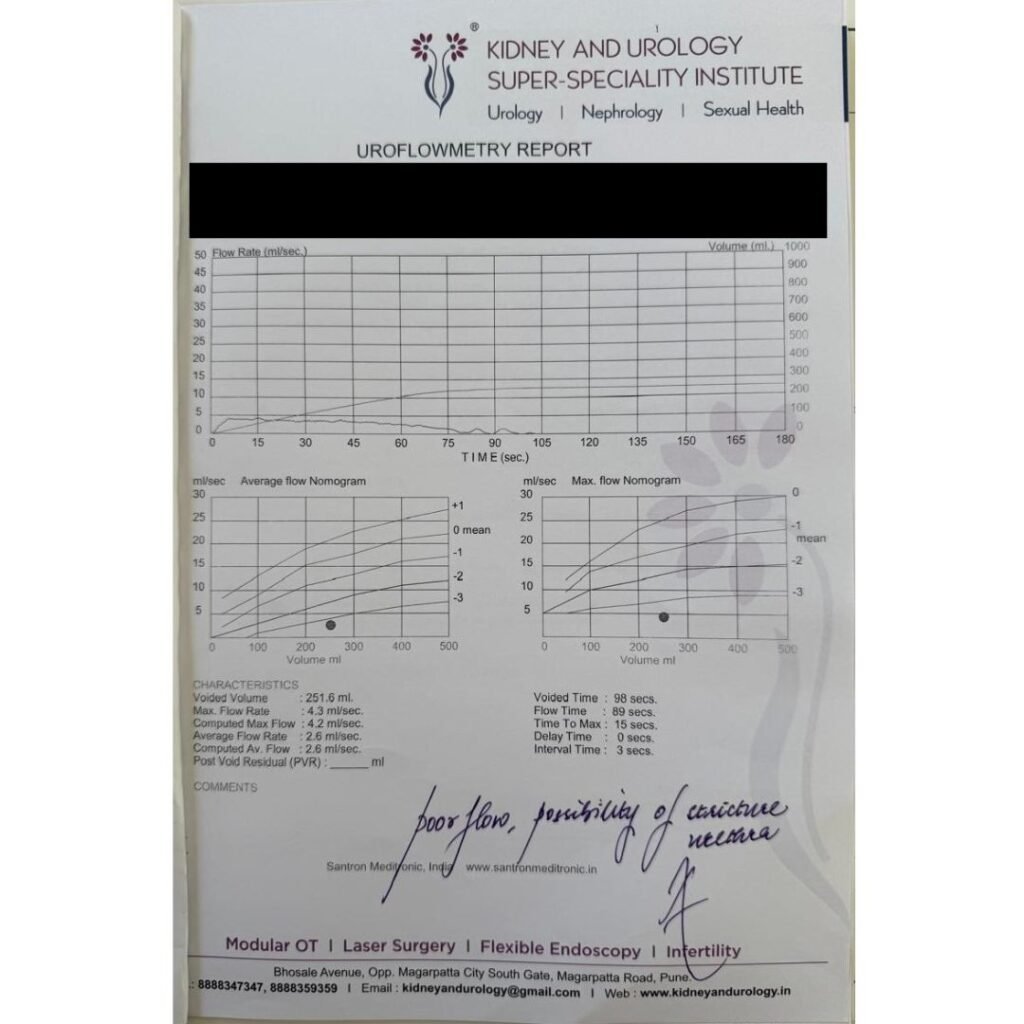Uroflowmetry is a simple vital diagnostic tool used in urology to assess urinary function. If you or someone you know has any urinary issues, understanding this test can be incredibly beneficial.
This blog will explain what uroflowmetry is, how it works, its significance, and what to expect during the procedure.
What is Uroflowmetry?
Uroflowmetry is an objective, simple, inexpensive and non-invasive test that measures the volume and speed of urine flow during urination. By analysing the flow pattern, healthcare providers can gain valuable insights into a person’s urinary health.
This test is particularly useful for diagnosing conditions that cause obstruction to the urinary tract, such as prostate enlargement, bladder conditions, neurological bladder issues and most importantly narrowing of the urethra (stricture urethra).
Why is Uroflowmetry Important?
The urinary system plays a crucial role in our overall health. Abnormalities in urinary flow can indicate underlying health issues. Uroflowmetry helps in:
– Diagnosing Conditions: It assists in identifying urinary tract obstructions, bladder dysfunction, and prostate problems.
– Monitoring Treatment: For patients undergoing treatment for urinary conditions, uroflowmetry can help evaluate the effectiveness of the therapy.
– Guiding Further Testing: The results can inform healthcare providers if additional tests or interventions are necessary.
When is Uroflowmetry Recommended?
Healthcare providers typically recommend uroflowmetry for patients experiencing:
– Difficulty urinating
– A weak urine stream
– Frequent urination or urgency
– A feeling of incomplete bladder emptying
It’s also commonly used for patients with conditions like benign prostatic hyperplasia (BPH), urinary tract infections (UTIs), or those with neurological disorders affecting bladder function.
Preparing for Uroflowmetry
Preparation for the uroflowmetry test is relatively straightforward. Here are some essential steps to follow:1
- Hydration: Drink plenty of fluids before the test to ensure you have a full bladder. Aim to arrive at the testing facility with a strong urge to urinate.
- Avoid Certain Substances: Refrain from consuming caffeine or diuretics for a few hours before the test, as these can affect your urinary patterns.
- Medication Review: Inform your healthcare provider about any medications you are taking. Some medications may need to be temporarily stopped as they can influence the test results.
- Timing: Try not to urinate for at least two hours before the test to ensure there is enough urine to measure accurately.
Good Flow

Poor Flow

The Uroflowmetry Procedure
The uroflowmetry test is simple and quick. Here’s what you can expect during the procedure:
- Private Setting: You will be guided to a private restroom equipped with a uroflowmetry machine, which includes a funnel connected to a recording device.
- Natural Urination: You will be asked to urinate into the uroflowmeter, allowing for a natural and uninterrupted flow. It’s essential to relax and urinate as you normally would.
- Data Collection: The uroflowmeter will measure and record various parameters, including:
– Total Volume of Urine: The amount of urine expelled during the test.
– Flow Rate: The speed at which urine is expelled, typically measured in milliliters per second.
– Duration of Urination: The total time taken to empty the bladder.
- Data Analysis: After the test, the collected data will be analyzed by your healthcare provider to identify any abnormalities or issues.
What Do the Results Mean?
Uroflowmetry results can provide insights into various urinary conditions:
– Normal Results: Indicate healthy bladder function and normal urinary flow rates. Values can vary based on age and sex.
– Abnormal Results: May suggest issues such as:
– Urinary Obstruction: Conditions like urethral strictures or bladder outlet obstructions can lead to reduced flow rates.
– Bladder Dysfunction: Weak bladder muscles or overactive bladder conditions can affect urine flow.
– Prostate Issues: In men, an enlarged prostate can impede urine flow, leading to symptoms of BPH.
Your healthcare provider will discuss the results with you, explaining what they mean in the context of your symptoms and overall health.
Benefits of Uroflowmetry
Uroflowmetry offers several advantages as a diagnostic tool:
– Non-Invasive: The test is painless and does not require any surgical procedures, making it a low-risk option for patients.
– Quick and Efficient: The entire process typically takes only a few minutes, allowing for rapid assessment of urinary function.
– Comprehensive Data: It provides detailed information about urine flow patterns, helping healthcare providers make informed decisions about diagnosis and treatment.
– Monitoring Tool: Uroflowmetry can be used to track the effectiveness of treatments over time, ensuring that any necessary adjustments can be made promptly.
Conclusion
Uroflowmetry is an essential tool in the field of urology, offering valuable insights into urinary health. By measuring the flow rate and volume of urine, this test helps diagnose various conditions that can affect the urinary system.
If you’re experiencing urinary issues, discussing the possibility of uroflowmetry with your healthcare provider could be a significant step toward understanding and improving your health.Understanding what to expect from uroflowmetry can alleviate any concerns you may have about the procedure.
Remember, this test is designed to help you and your healthcare provider work together to ensure your urinary health is at its best.Don’t hesitate to reach out to your healthcare provider if you have any questions or need further information about uroflowmetry or your urinary health!
FAQs
What is Uroflowmetry?
Uroflowmetry is a non-invasive test that measures the volume and speed of urine flow during urination. It helps healthcare providers assess urinary function and diagnose conditions affecting the urinary tract.
Why is uroflowmetry important?
Uroflowmetry is important because it helps in diagnosing urinary tract obstructions, bladder dysfunction, and prostate problems. It also assists in monitoring treatment effectiveness and guides further testing if necessary.
When is uroflowmetry recommended?
Uroflowmetry is typically recommended for patients experiencing difficulty urinating, a weak urine stream, frequent urination or urgency, or a feeling of incomplete bladder emptying. It is also commonly used for patients with conditions like benign prostatic hyperplasia (BPH), urinary tract infections (UTIs), or neurological disorders affecting bladder function.
How should I prepare for uroflowmetry?
To prepare for uroflowmetry, drink plenty of fluids before the test to ensure you have a full bladder. Avoid consuming caffeine or diuretics for a few hours before the test, and inform your healthcare provider about any medications you are taking. Try not to urinate for at least two hours before the test.
Lorem ipsum dolor sit amet, consectetur adipiscing elit. Ut elit tellus, luctus nec ullamcorper mattis, pulvinar dapibus leo.
What happens during the uroflowmetry procedure?
During the uroflowmetry procedure, you will be asked to urinate into a uroflowmeter, which measures and records various parameters, including total volume of urine, flow rate, and duration of urination. The test is conducted in a private restroom equipped with the necessary equipment.
What do the results mean?
Normal uroflowmetry results indicate healthy bladder function and normal urinary flow rates. Abnormal results may suggest issues such as urinary obstruction, bladder dysfunction, or prostate problems. Your healthcare provider will discuss the results with you and explain what they mean in the context of your symptoms and overall health.
What are the benefits of uroflowmetry?
The benefits of uroflowmetry include being non-invasive, quick and efficient, providing comprehensive data, and serving as a monitoring tool to track the effectiveness of treatments over time.
Is uroflowmetry painful?
No, uroflowmetry is not a painful procedure. It is a non-invasive test that does not require any surgical procedures.
How long does the uroflowmetry test take?
The uroflowmetry test typically takes only a few minutes to complete.
When will I receive the results of my uroflowmetry test?
The results of your uroflowmetry test will be analysed by your healthcare provider, and they will discuss the findings with you during your next appointment or as soon as possible.
